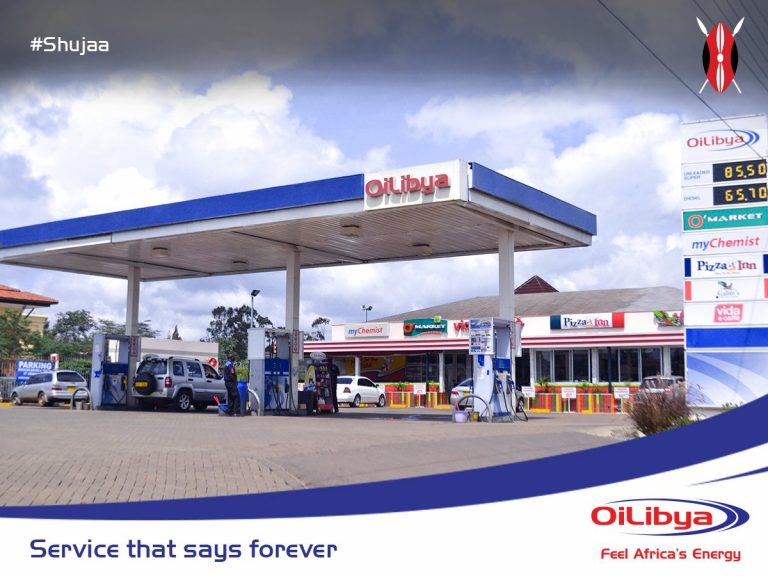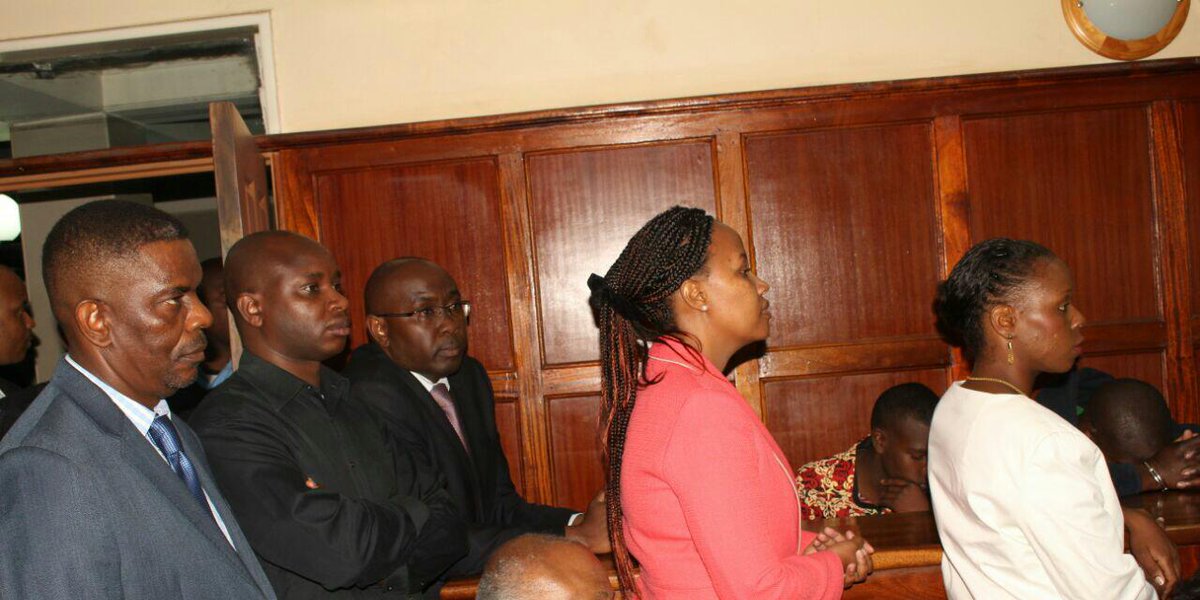
A storm is brewing in OiLibya that may have a negative impact on its earnings and reputation. What is now emerging is a tale of mismanagement and seeming disregard for the law in Kenya by OiLibya. Criminal court papers show senior managers of the company made a forced entry to a petrol station.
In Kenya, if an employee commits a criminal act in the course of their duties, then Directors are liable. The Chairman and Director Mr. Kashim El Marimi submitted a Board resolution to the court. The resolution stated that the General Manager conducts executive functions within OiLibya Kenya.
The General Manager, Zimbabwean Duncan Murashiki 55, faces charges of malicious damage to property. Other charges include breaking and entering a building and committing a felony.
Three senior managers and one contractor face similar charges to Duncan Murashiki. The next hearing of the case that started in July 2017 is on 30th January this year. Mr. Murashiki’s actions were so contentious that the company lawyer quit in August 2017.
Ownership
Libya Oil Kenya is a wholly owned subsidiary of Tamoil Africa Holdings Limited (TAHL). Malta registered TAHL is an investment of Libya Africa Investment Portfolio (LAIP). The main shareholder of TAHL is Libya Oil Holdings Limited (LOHL). Other shareholders include TCV Management and Trust Services Limited.
LOHL accounts for 22% of the LAIP investment portfolio. Other LAIP investments include Libya Arab African Investment Company (LAICO) and Rascom Star.
In 2006, the Libyan Government established the Libyan Investment Authority (LIA). It aims to steer investments of the Libya sovereign fund on behalf of all Libyans for posterity. LOHL was also established in the same year as LAIP, while TAHL was in 2002.
In 2016, the Presidential Council appointed an Interim Steering Committee to LIA. Dr. Ali Mahmoud Hassan is the head of the Steering Committee formed through decree 115. LIA has invested 40% of its funds in investments in companies belonging to the LAIP among others.

Management
Mr. Murashiki reports to Ibrahim Bughaigis whose office is in Jumeirah, Dubai. Lawyer and activist Mrs. Salma Bughaigis who was killed in Benghazi in 2013 was sister to Mr. Bughaigis. He has a home in France and married to a French national.
Mr. Murashiki lives in Cape Town South Africa with wife Siphiwe Jana, a son Daniel and daughter Sarah. He has worked for Engen in East Africa from where he closed down the Engen Uganda operations.
Sources say that Mr. Murashiki is the poster boy for Mr. Bughaigis and they have an unusual bond. Mr. Murashiki has the best contract terms among his peers in Africa. This is despite Libyan nationals running bigger and better performing operations.
Mr. Murashiki exposed the company when he transferred the previous finance manager in 2014. The company has been running with temporary and acting finance managers until 2017.
Tax Noncompliance
Kenya Revenue Authority (KRA) in December 2016 sent OiLibya Kenya a “show cause” letter. The letter required an explanation for several tax noncompliances and outlined some penalties. Sources say that the penalties may be in the millions of dollars.
Further discussions & meetings between KRA and OiLibya Kenya have revealed further noncompliance. Some of the concerns relate to financial reporting malpractice & potential fraud.
Valuation
Tamoil Africa Holdings concluded the buying of the company from Mobil in 2007. The estimated transaction price was $50 million. Today, the valuation of the business by assets is between $75-$100 million.
Valuation of the business based on free cash flows and dividends is much lower. This is because the return on capital or shareholder equity is less than 3% per annum. This performance brings into question the quality of management in Kenya.
Uganda
Kenya took over operation of the Uganda affiliate which has lost millions of dollars. The Uganda affiliate was insolvent at the end of 2016. The affiliate was only able to survive through the supported of Kenya.
The Uganda operation assets consist of six petrol stations and LPG filling plant. Most of the business is wholesale to customers like the military and construction projects.
Sources say Mr. Bughaigis and Mr. Murashiki intend to invest $10 million more in Uganda. The targeted company is a small oil company with no more than 10 petrol stations. Disclosures show that the assets are overvalued and the acquisition will lead to losses.
Uganda has been a difficult business location for OiLibya. In 2013, Kenya wrote off $5 million in losses from a joint venture called Africa Oil Supply (AOSL). The Joint venture supplied fuel oil to an independent power producer in Uganda.
Poor Performance
In 2011, the year of deposition of Muammar Qaddafi, Kenya had it’s best financial results to date. In the years 2014 to 2017, the company performance has trailed its local competitors. The company has also lost sales market share in each successive year since.
Kenya has been one of the top 5 earners for TAHL and its shareholder LOHL. Other top earners include Morocco, Cameroon, Gabon, Tunisia, Egypt, Ethiopia, and Reunion. These eight affiliates account for between 75% a 95% of TAHL earnings in any given year. Loss of earnings from Kenya would be a big blow to the total earnings of TAHL.
Despite previous good earnings, sources say that dividend payouts from Kenya have been inconsistent. The company is cash-strapped and operates with a financial gearing of greater than 90%. To access financing, the company has given a negative pledge against assets and inventory.
To make up for poor financial performance, the Kenya operation is selling off assets. Reports show that the Director’s house in an upmarket area is up for sale at more than $3 million. Kenya expects to shore up earnings & dividend payout through the proceeds of the asset sale.
Negative Publicity
The press picked up the story. Local dailies “The Star” and “Daily Nation” published pictures of the accused in court. A TV clip on national television showed Mr. Murashiki in a pensive mood in court. To avoid the press on 15 December, Mr. Murashiki attended court flanked by 4 bodyguards.
As a result of the personal conduct of Mr. Murashiki in Kenya, the bloggers have had a field day. The bloggers have highlighted Mr. Murashiki’s indiscretions on the Internet. One of the bloggers has more than 1.2 million followers on Twitter. As a result, the company has suffered severe negative publicity.
An Internet search of “Duncan Murashiki” reveals allegations of bribery and the criminal case. Closer perusal of the bribery claim also reveals sexual impropriety and harassment of staff.
A search for “Duncan Murashiki” within Twitter reveals a new allegation. One of using state officials to frustrate the criminal case against Mr. Murashiki. Sources say that Mr. Murashiki has Mr. Bughaigis’ support in this high-risk strategy.
The business community is now monitoring the criminal case as it may set new precedents in Kenyan law. Loss of the case by Oilibya will result in a conviction with jail terms of over 4 years for Mr. Murashiki and his staff.
The happenings in court on 30 January will also reveal what the future holds for the Kenya operations. The criminal case, together with the tax investigations put the Kenya assets at risk.
Who’s to blame?
Sources say that mismanagement by the poster boy, Mr. Murashiki is to blame. The state of affairs calls into question Mr. Bughaigis management supervisory and executive skills.
There are concerns that Mr. Bughaigis has not appraised or made full disclosure to the Board of TAHL and LOHL. Worries persist of the depth of the oversight function by LAIP and LIA over assets in their control.
At the end of the day, any losses must be borne by the Libyan people into posterity. To cover for losses, TAHL will draw funds from dividends from better-performing affiliates.
Observers are keen to see if LAIP and LIA will tolerate losses of this nature in the Libyan sovereign funds. The sovereign funds are a legacy and heritage to future generations of all Libyans.





